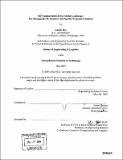| dc.contributor.advisor | James Masters. | en_US |
| dc.contributor.author | Roy, Ankur, 1976- | en_US |
| dc.contributor.other | Massachusetts Institute of Technology. Engineering Systems Division. | en_US |
| dc.date.accessioned | 2005-09-27T17:06:37Z | |
| dc.date.available | 2005-09-27T17:06:37Z | |
| dc.date.copyright | 2003 | en_US |
| dc.date.issued | 2003 | en_US |
| dc.identifier.uri | http://hdl.handle.net/1721.1/28575 | |
| dc.description | Thesis (M. Eng. in Logistics)--Massachusetts Institute of Technology, Engineering Systems Division, 2003. | en_US |
| dc.description | Includes bibliographical references (leaves 60-62). | en_US |
| dc.description.abstract | Oil and transportation have been commingled since the first oil reserves were discovered. The importance of energy, namely oil, and the transportation of that energy from the producers to the consumers is persistently monitored and evaluated. Oil producers often seek novel transportation channels to increase oil production, thereby increasing revenues. Oil consumers seek unique transportation nodes to reduce their reliance on a single set of producers while potentially reducing prices. An example of the transportation interplay between global producers and consumers is highlighted by the Murmansk Oil Terminal and Pipeline proposal that seeks to provide Russian oil to the United States in a safe, efficient, and economic manner. The framework and corresponding feasibility analysis highlight the importance of oil transportation in a global landscape and peruse the macro and micro variables that intertwine and impact that landscape. A thorough evaluation of both Russian and US oil reliance must be understood, while extrapolating the influence of ancillary players such as OPEC, West Siberian Oil Reserves, the Murmansk locality, and the marine transportation industry. This thesis seeks to provide a overview of the oil industry generally, while specifically focusing on marine oil transportation. The thesis does so with a case evaluation of the Murmansk Oil Terminal and Pipeline project. | en_US |
| dc.description.statementofresponsibility | by Ankur Roy. | en_US |
| dc.format.extent | 62 leaves | en_US |
| dc.format.extent | 2688478 bytes | |
| dc.format.extent | 2694171 bytes | |
| dc.format.mimetype | application/pdf | |
| dc.format.mimetype | application/pdf | |
| dc.language.iso | en_US | |
| dc.publisher | Massachusetts Institute of Technology | en_US |
| dc.rights | M.I.T. theses are protected by copyright. They may be viewed from this source for any purpose, but reproduction or distribution in any format is prohibited without written permission. See provided URL for inquiries about permission. | en_US |
| dc.rights.uri | http://dspace.mit.edu/handle/1721.1/7582 | |
| dc.subject | Engineering Systems Division. | en_US |
| dc.title | Oil transportation in the global landscape : the Murmansk Oil Terminal and Pipeline proposal evaluated | en_US |
| dc.type | Thesis | en_US |
| dc.description.degree | M.Eng.in Logistics | en_US |
| dc.contributor.department | Massachusetts Institute of Technology. Engineering Systems Division | |
| dc.identifier.oclc | 57468001 | en_US |
